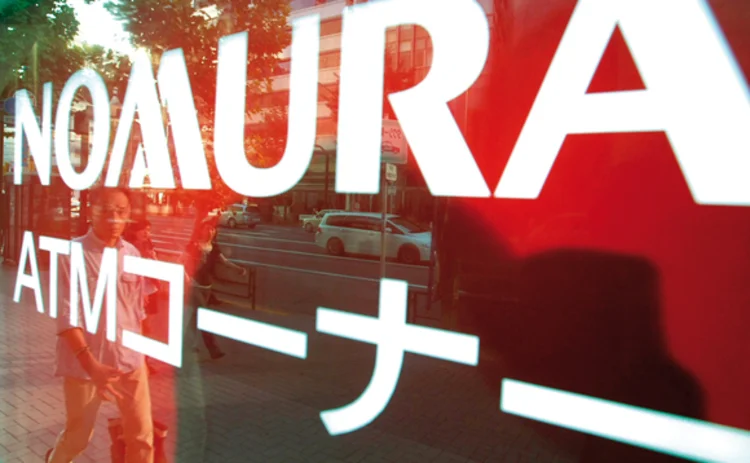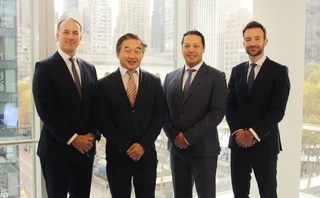
Derivatives house of the year, Japan: Nomura
Asia Risk Awards 2024

Nomura, Japan’s biggest brokerage and investment bank, has made ambitious strides in building out its equity derivatives and quantitative investment strategies (QIS) businesses within its home market in the past 12 months.
Nomura’s emergence as a contender in Japan’s fiercely competitive equity derivatives and QIS market has been several years in the making. It began with the return to Tokyo of Hiroshi Shikano, Nomura’s head of global markets structuring for Japan, who had spent five years working for the bank in London. Tasked with leading the development of a new and improved equity derivatives and QIS business, Shikano immediately identified product development and distribution enhancement as critical pillars for the business’s success.
To help revitalise product offerings, Nomura recruited more than 20 QIS specialists from leading financial institutions worldwide. Shikano says he replaced roughly 30–40% of personnel on the team to inject fresh perspectives and expertise into the business. The bank also established a dedicated sales team focused on QIS distribution.
The strategy is already beginning to yield results. With volatility reemerging in Japan across multiple asset classes in the past year, the bank noted strong demand from institutional investors – including banks, pension funds and insurers – for hedging solutions.
Various QIS products were developed tailored specifically to meet this demand, helping the bank to nearly double its QIS assets under management.
Now, as demand in the Japanese investment market shifts away from traditional carry strategies to more defensive strategies, Nomura is working to align its product suite with this trend.
“We are now back in the game,” says Shikano. “We have a good pipeline with financial institutions, and we are well-positioned to seize new opportunities.”
Regional success
Japan’s regional banks have been a particularly fruitful client segment for Nomura’s budding QIS business in the country. Shikano reasons that Nomura’s investment bank competitors in the QIS space tend to focus almost exclusively on the top regional banks in Japan. But Nomura, with multiple offices across the country, has far greater depth of connectivity with Japan’s regional banks, allowing the QIS team to market solutions to institutions neglected by its rivals.
A volatility selling strategy innovation proved especially popular with Nomura’s Japanese regional bank clients. These banks, serving farming cooperatives and local industry, require a certain level of yield on their banking business to stay viable. Faced with a dearth of yield opportunities in Japan’s domestic fixed-income market due to years of ultra-low interest rates, many of these banks turned to cross-border trades to put their excess lending capacity to work. When the dollar yield curve was steep, buying 10-year US Treasuries and swapping the coupons into JPY was the go-to investment. But after the US Federal Reserve began raising interest rates in 2022, the USD yield curve steepened and, as a result, currency hedges began to wipe out returns.
Japanese regional banks turned to selling volatility, through one-month call options on indexes such as the Nikkei 225 and S&P 500. That worked for a while until volatility decreased and premiums declined, which reduced the yield such strategies generate.
Against this backdrop, Nomura became the first bank to offer a zero-day volatility selling strategy in a private mutual fund format to Japanese regional bank clients. The strategy works by reducing the maturity of S&P 500 options being sold to zero day to expiry (0DTE), which compensates for the drop in volatility and allows clients to continue to earn high premiums. The 0DTE strategy also benefits from a risk management overlay, distinguishing it, Shikano says, from some of the other 0DTE-based strategies that have recently been developed across the street.
“What we did was create a simple option-trading strategy that can trade either puts or calls based on a mean reversion signal, in order to have risk mitigations, which is differentiating, versus what other counterparts would be showing,” he says.
Shikano adds that this 0DTE strategy underscores a key part of Nomura’s strategy for building its QIS business in Japan. This is to be competing on ideas and execution rather than price. By focusing on scalability and client service, Nomura aims to distinguish itself from competitors and structure a range of products cleverly tailored to address specific client needs.
The growing index-creation capabilities of Nomura’s QIS platform have also been deployed in the manufacture of a fixed-index annuity solution for Japanese insurers.
Nomura recently launched a fixed indexed annuity product using a reinsurance format. The financial group is able to provide a packaged solution that leverages its reinsurance company, Nomura Re, and its QIS platform to create an index.
“We have a very strong relationship with Japanese insurance companies,” says Shikano. “And we are the only Japanese firm that can provide this type of packaged solution. I’m confident we can increase our share.”
Looking ahead, Shikano sees a big opportunity to build upon Nomura’s QIS success with institutional clients through targeting new clients in the wealth management arena.
“The Nomura management is focusing on group-wide synergy. We are now planning to launch more QIS-linked structured products not only to institutional clients but also to high-net-worth clients,” Shikano says . “This area can be kind of a blue ocean for Nomura.”
Only users who have a paid subscription or are part of a corporate subscription are able to print or copy content.
To access these options, along with all other subscription benefits, please contact info@risk.net or view our subscription options here: http://subscriptions.risk.net/subscribe
You are currently unable to print this content. Please contact info@risk.net to find out more.
You are currently unable to copy this content. Please contact info@risk.net to find out more.
Copyright Infopro Digital Limited. All rights reserved.
As outlined in our terms and conditions, https://www.infopro-digital.com/terms-and-conditions/subscriptions/ (point 2.4), printing is limited to a single copy.
If you would like to purchase additional rights please email info@risk.net
Copyright Infopro Digital Limited. All rights reserved.
You may share this content using our article tools. As outlined in our terms and conditions, https://www.infopro-digital.com/terms-and-conditions/subscriptions/ (clause 2.4), an Authorised User may only make one copy of the materials for their own personal use. You must also comply with the restrictions in clause 2.5.
If you would like to purchase additional rights please email info@risk.net
More on Awards
Clearing house of the year: LCH
Risk Awards 2025: LCH outshines rivals in its commitment to innovation and co-operation with clearing members
Best use of machine learning/AI: CompatibL
CompatibL’s groundbreaking use of LLMs for automated trade entry earned the Best use of machine learning/AI award at the 2025 Risk Markets Technology Awards, redefining speed and reliability in what-if analytics
Markets Technology Awards 2025 winners’ review
Vendors jockeying for position in this year’s MTAs, as banks and regulators take aim at counterparty blind spots
Equity derivatives house of the year: Bank of America
Risk Awards 2025: Bank gains plaudits – and profits – with enhanced product range, including new variants of short-vol structures and equity dispersion
Law firm of the year: Linklaters
Risk Awards 2025: Law firm’s work helped buttress markets for credit derivatives, clearing and digital assets
Derivatives house of the year: UBS
Risk Awards 2025: Mega-merger expected to add $1 billion to markets revenues, via 30 integration projects
Interest rate derivatives house of the year: JP Morgan
Risk Awards 2025: Steepener hedges and Spire novations helped clients navigate shifting rates regime
Currency derivatives house of the year: UBS
Risk Awards 2025: Access to wealth management client base helped Swiss bank to recycle volatility and provide accurate pricing for a range of FX structures







